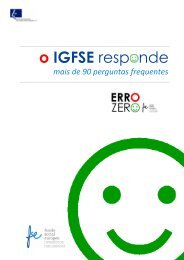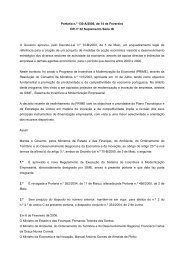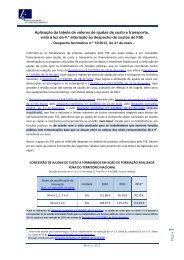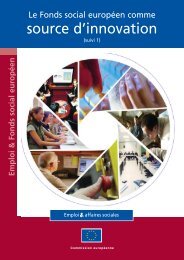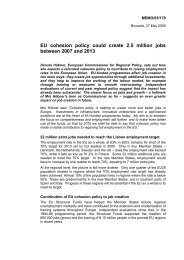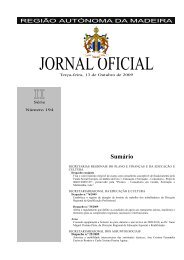Industrial Relations in Europe 2012 - European Commission - Europa
Industrial Relations in Europe 2012 - European Commission - Europa
Industrial Relations in Europe 2012 - European Commission - Europa
Create successful ePaper yourself
Turn your PDF publications into a flip-book with our unique Google optimized e-Paper software.
Cockpit Association (ECA), and ETF express their wish that the pr<strong>in</strong>ciples of the above regulations,<br />
based on place of work, be applied to mobile air transport workers. The social partners believe that<br />
the "home base" of mobile air transport workers is the best determ<strong>in</strong>ant of the applicable social<br />
security law. Many airl<strong>in</strong>es provide their services from so-called home bases, the place where the<br />
personnel normally starts or ends a duty period or a series of duty periods This is also the location<br />
with which the worker has the greatest connection dur<strong>in</strong>g their employment. The new social<br />
security rules for aircrew, 103 which came <strong>in</strong>to force on 28 June <strong>2012</strong> clarify that they are due to pay<br />
social security contributions and are eligible to receive benefits <strong>in</strong> the country where they start and<br />
end their shifts, <strong>in</strong> other words their home base, <strong>in</strong>stead of that the country where their airl<strong>in</strong>e is<br />
based.<br />
There rema<strong>in</strong> obstacles to the mobility of cultural workers and productions with<strong>in</strong> and outside the<br />
EU. In April 2011, the social partners <strong>in</strong> the live performance sector adopted a jo<strong>in</strong>t statement<br />
call<strong>in</strong>g upon culture m<strong>in</strong>isters to support the establishment of Mobility <strong>in</strong>formation services for<br />
artists and for culture professionals <strong>in</strong> the Member States. They believe that such a network of<br />
<strong>in</strong>formation po<strong>in</strong>ts across <strong>Europe</strong> would answer the need for basic <strong>in</strong>formation, as well as tailored<br />
advice and guidance for culture professionals work<strong>in</strong>g or seek<strong>in</strong>g to work <strong>in</strong> another Member State.<br />
They called for their national members to be <strong>in</strong>volved <strong>in</strong> the creation and management of such<br />
structures.<br />
Capacity-build<strong>in</strong>g<br />
The social partners <strong>in</strong> several sectors took actions to strengthen social dialogue through capacitybuild<strong>in</strong>g<br />
measures. Most of the <strong>in</strong>itiatives were targeted at the new Member States, where social<br />
partners are usually weaker (see Chapter 2). For <strong>in</strong>stance, <strong>in</strong> the construction sector, EFBWW ran a<br />
project on Capacity Build<strong>in</strong>g for Sett<strong>in</strong>g up Paritarian Funds <strong>in</strong> Central and Eastern <strong>Europe</strong>an<br />
Countries. Other <strong>in</strong>itiatives were aimed at re<strong>in</strong>forc<strong>in</strong>g the exist<strong>in</strong>g <strong>Europe</strong>an and the national<br />
networks of the social dialogue, for example a project managed by EFFAT <strong>in</strong> the agriculture<br />
sector.<br />
In close cooperation with the sectoral <strong>Europe</strong>an social partners, the International Tra<strong>in</strong><strong>in</strong>g Centre of<br />
the ILO organised <strong>in</strong> 2011 two parallel capacity-build<strong>in</strong>g projects <strong>in</strong> the commerce sector,<br />
target<strong>in</strong>g respectively employers' organisations and trade unions <strong>in</strong> the new Member States and<br />
some Candidate Countries. The projects aimed to re<strong>in</strong>force the <strong>in</strong>stitutional capacity of national<br />
organisations, <strong>in</strong> order to improve engagement <strong>in</strong> policy development and sectoral social dialogue,<br />
both at national and EU level. As the projects ran <strong>in</strong> parallel, an <strong>in</strong>tegrated approach was ensured<br />
and social partnership was fostered. A bipartite workshop brought all participants together at the<br />
end of the period of separate tra<strong>in</strong><strong>in</strong>g actions.<br />
In December 2010, the social partners <strong>in</strong> the temporary agency work sector, Eurociett and UNI<br />
<strong>Europa</strong>, organised a round table on temporary agency work social dialogue <strong>in</strong> Istanbul <strong>in</strong><br />
coord<strong>in</strong>ation with the Turkish social partners. As was the case with previous round tables <strong>in</strong> a<br />
number of countries (such as Bulgaria <strong>in</strong> 2009, Hungary <strong>in</strong> 2007 and Poland <strong>in</strong> 2006), the aim was<br />
103 Regulation (EU) 465/<strong>2012</strong>; OJ L 149, 8.6.<strong>2012</strong>, p. 4<br />
293



